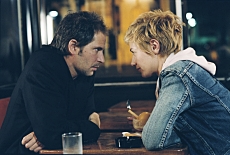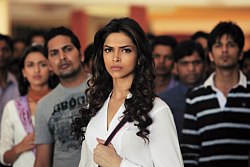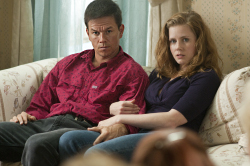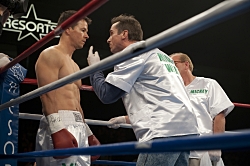So welcome to London. Location is important to this film as it is a core theme with the characters revolving around one road, Avenue Montaigne in Paris and a single cafe. So I’m pleased that you chose this location for today’s conversation as this road too (Cromwell Place, South Kensington) has a similarly illustrious history. The artist Francis Bacon lived a few doors down and Roman Polanski filmed Repulsion here with Catherine Deneuve.
Popular on LondonNet
CT: Really, just here?
Yes and one of London’s oldest cafés, Dino’s (est 1949) lies opposite which is very appropriate.
DT: So we can do a remake here then (laughs).
Why not!
Daniele, you’ve mainly done writing in the past and now this is your third film as director. Which do you prefer, writing or directing?
DT: There is no question, I consider myself as a writer first and foremost as I have been a writer for a long time. But I consider that writing is a natural step to becoming a director. You know this is a long career and people once in a while say ‘why don’t you direct a film?’ And I say ‘but you know I am a writer and I’m happy and I’m doing well, I love different experiences with different directors’. But it’s true that at one point I suddenly thought, ‘Why don’t I try it’ just out of curiosity more than anything else, just to see whether I was capable of doing it. You know it was a little bit of the Orchestra Seats syndrome, you know where are you sitting in a wonderful place in the room and the stage you know is there, so yes, I suppose I myself was a victim of that Orchestra Seats syndrome. So, I think I am getting older and so I must do this now. And I must say if my first film had not been a success I would have gone back to the writing.
So in a way it was less of a risk for you because you had something strong to go back to?
DT: Yes exactly. But then the first experience was wonderful. I created this team of writers with Christopher, now I had been a co-writer myself before but I suddenly found I needed a co-writer so I tried with Christopher and we found it worked. And then of course the film was a success and then suddenly it becomes fun to do another one and then another one.
CT: It becomes almost logical.
DT: It wasn’t logical for long, which is why it is a strange thing. But I think most people thought of it earlier. And I think Christopher has thought of it earlier.
And so the same question for you Christopher but in a different way. I understand that you have done more writing than acting. Which do you prefer?
CT: Well I started off being an actor for a number of years before I started writing and then I think it is the same kind of syndrome. You know I liked my life as an actor but I wasn’t completely satisfied. I definitely needed something else, something different and I started writing and then shortly after that I’d given a piece of work that I’d written with a friend that I later wrote two films with and I gave it to my mother who was definitely interested by it and that’s when she was looking also for a partner and that’s the way that we started this collaboration.
It’s very unusual I think.
CT: That’s right it’s very unusual and that’s why people talk about it with us. People are very curious about it. But to answer your question, it’s been a more interesting life as an actor since I’ve been writing and definitely having been an actor helps me in my writing. And to get back to this team of writing it’s very much like any other writing duo, we work together very defined hours and throw ideas around.
And when you write do you write together, in the same room? I understand that your professional lives might make it difficult to be together all the time.
DT: Yes very much. It is very concentrated, going over things, changing things, we spend a long time talking about who these people are and what their drive is. What they are doing point, from the beginning of the film to the end. Because these are stories about people basically.
CT: We do it in an office hour environment, because we need a structure. So we meet in a room and we start working, after having procrastinated a little bit.
There are many unusual things about this film, which is always good, but one important thing here is that you are directing four directors (Sydney Pollack, Valerie Lemercier, Albert Dupontel and Daniel Benion). This seems quite daunting to me, maybe one director, maybe two… but four. How was that for you?
DT: Well, Daniel is a theatre director and the other three had just finished directing projects themselves and they were so relieved. Sydney Pollack had just finished The Interpreter for example. And they had had a hard time, because it is a hard task. No matter how big or small the film is it always very hard. So they were so happy to just arrive in the morning and be told what to do; ‘you sit here, you speak there’, whatever.
So it was relaxing for them in a sense?
DT: Yes and very quickly you know they were happy and not at all getting involved in the mechanics, ‘camera here, camera there’ or whatever. Not at all, they were really the most easy actors possible.
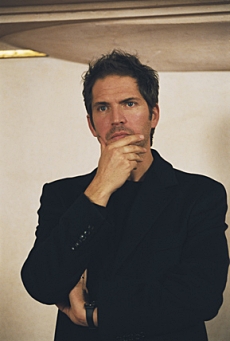 So will you work with them again do you think?
So will you work with them again do you think?
DT: Oh yes, I would love to. All of them.
CT: But also when you are in that position (a director acting), you have to be very precise to do it. You don’t have to worry about every other detail, so usually you don’t.
I’d like to move on now to some of the characters in the film. Firstly, Catherine played by Valerie Lemercier, I felt that I warmed to her through the film as she warmed to herself. Obviously at the beginning of the film she is going through a struggle (trying to ditch here soap-star image and move on to ‘serious’ film acting). Can you tell me about her character and how she developed in your minds?
DT: You see we really do know these kind of people. They really do exist, they are in England, in America and in France and wherever you have a big film and a big television industry. This story of being a star on television and then wanting to go on to something else, it is very hard – this is a fact of life.
There is a sort of snobbery?
DT: Yes and the film is also about snobbery. It is about where culture is and elites…
CT: … and about people being labelled, tagged, put into boxes.
DT: And Valerie Lemercier is very well known in France, she is an actor, a director, she is also a clown – she has a one woman show and she is set to present the Cesars this weekend. She will do it in a very arrogant and hilarious way.
Moving on, there are many key characters in the film, but the central figure is Jessica, played by Cecile de France. She is the cement that sticks the other characters together and she gives the film a positive view of the human condition, whereas other parts of the film show more the negative side. Was that important to you to have a positive feeling at the end?
CT: It’s very true what you said, she brings a fairytale quality to the film that is also (useful) for us to talk about very many other important parts of the story. The film is a little bit on the edge of reality. Of course we do talk about very serious aspects of life, like ageing, communicating and illness. So having this tinkerbell character who goes around makes it all bearable in a way. She helps show the contradiction of life.
DT: I think she is not a naïve person, she is just nice to people.
Like a ‘child of nature’?
DT: Yes, exactly. This is very much something that we wanted when we were writing this film. It’s very rewarding for us that these sort of themes actually come out – it is very much the story we want to tell.
Another aspect I wanted to talk to you about is that I think it is quite rare for a film to be so multi-generational, there is young Jessica and then the other characters go up through the ages to the frail Jacques (played by Claude Brasseur). Do you think that comes from your generational difference, being mother and son?
CT: Yes there is a span of ages here, but that just feels real, you know with this elderly person and Jessica.
DT: And also it is about different stages of your life. Your age and your crisis. Because everybody is some kind of turmoil. You know when you tell a young woman of twenty that she can be a very famous television actress, she signs right away. What is going to happen? This young girl Jessica is going to have an affair with this very interesting and rich young man and so in twenty years she is going to be a rich bourgeois and hate her life or she is going to have something very different. Who knows what is going to happen. I think maybe we should think about doing a sequel to this film in ten years.
CT: It’s almost inevitable that we should do a sequel to this film – people keep asking this question!
Like with Richard Linklater’s Before Sunrise and Before Sunset then? I understand they will do another follow up in eight years time.
CT and DT: Yes.
I did read that another another critic said this film was a good advert for France and that lots of people who see it will want to come to Paris…have you noticed that there are more people now on the Avenue Montaigne?
DT: Yes, there are definitely more people in the café now. The café was always full but there are definitely now people who come to the café from other areas of Paris or elsewhere. So they kind of look you know – take a peep, this is definitely true.
CT: But I’m not sure if that’s what we need right now, if there is one thing that is going on with Paris now is it’s just so many tourists.
DT: Yes, but this was not a very famous café before. Everybody local to the area knows it, it is like the café that you describe here in South Kensington.
Catherine (Valerie Lemercier) is about to open in a play by Feydeau farce at the Comedie des Champs-Elysee theatre. And influences of Feydeau come in and out during the film. Why did you choose Feydeau for this part of the story?
DT: Because it symbolises exactly what we wanted to talk about in the film. Because Feydeau is pure comedy as they say in France. And Feydeau has never stopped being re-done in all the French theatres.
CT: He’s a classic. He’s part of the repertoire of the Comedie de Francaise. But it’s still not pure comedy, there is psychology too.
DT: Now after years and years having been considered commercial and a joke and so on, now the attitude changing and he is becoming more seriously considered.
CT: What would be the equivalent in England, Noel Coward maybe?
Maybe even Shakespeare, in his day he wanted to entertain first and foremost.
CT: You know again it is all about labels, snobbery and what people think. If you are at a dinner party and you saw a great film that you loved but you don’t think it will go down very well for you to say so…
Like an Arnold Schwarzenegger film maybe?
DT: Yes, you’re right (laughs).
CT: Or Bridget Jones or something.
The film centres around the 17th of March. Is there a significance to this?
DT: Yes it is my mother’s birthday! It’s not because of the Irish St.Patrick’s day, I mean it’s not the St Patrick’s day for the meaning of this date in the film. Just my mother’s birthday. A lot of people in America say, ‘why did you choose St Patrick’s day…’
And finally one of my favourite lines in the film is from father Jacques to son Frederic namely: ‘at your age you build a house, at mine you buy one’. So Christopher, as you play Frederic, can I ask are you building a house, or buying one?
CT: (laughter) I’m building one!
Is that literal?
CT: Yes, I’m literally building one in Paris right now…probably what my friends call a white elephant. But you know it is a question of time, I have a little time left so this makes sense.
Ok, thank you very much for your time today and I wish every success with the film’s release in Britain.
– Peter D. Clee (February 2007)
And as if to sum up the passing of time and frailty of life, the film is dedicated to Suzanne Flon – who played Jessica’s grandmother here – a stalwart of French movies who died, aged 87, just after shooting of the film was completed.


